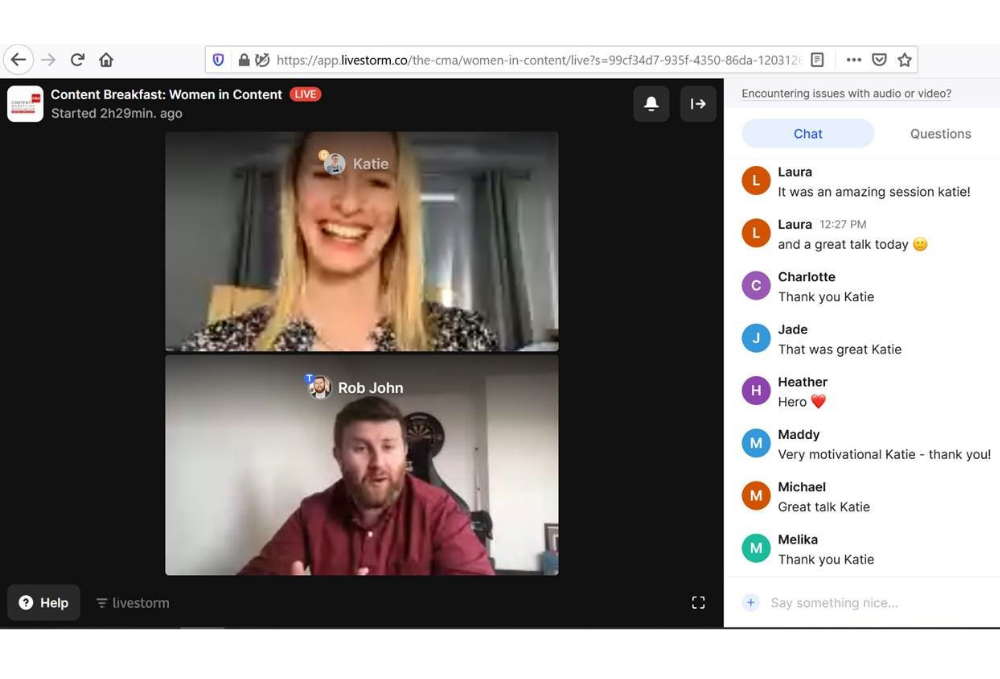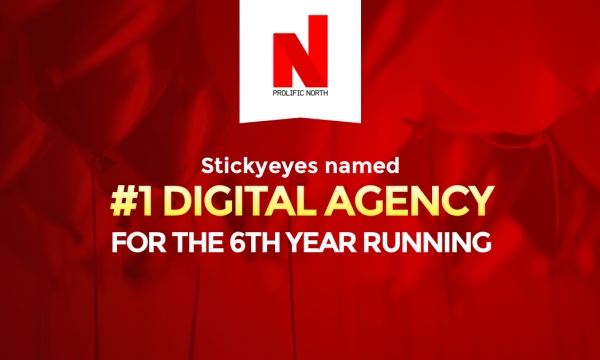Stickyeyes Earned Communications Director, Katie Fincham, joined The CMA panel on Women in Content to celebrate International Women's Day 2021. Alongside amazing speakers from Bloomberg and SevenC3 who produce Sainsbury’s magazine brand, Katie spoke about the power of connections and embracing change alongside eight other things she's learnt in a decade in content marketing.
Stickyeyes is nearly 25 years old and Katie has worked at the agency for the past 11 years, nearly half it's lifetime. Her role is to lead and direct our content and PR team, one of the largest teams in the business. The team has over 40 talented individuals, across a range of backgrounds – journalism, marketing, PR, blogging - and her aim is to ensure we deliver the very best work for our clients and to keep developing our team. Katie is also mum to two-year-old Emily, and currently works part-time.
2020 gave us all the opportunity to step back and reflect so, in Katie's talk for The CMA she shared some of the key lessons she's learned over the past decade that have helped in her career development.

1. Find something you’re passionate about
So, it’s no secret to my friends and colleagues, but I’m passionate about my job. Yes, I’m a workaholic, but I really enjoy and thrive off it. We’ve all had “ok” jobs, jobs that got you by, jobs you didn’t mind, but I can truly say I look forward to work. It’s different every day and it challenges me. For me, it’s essential to find a job that you enjoy. It doesn’t need to be your only passion – my other loves are food, travel (when it’s possible!) and family – but I just couldn’t do a 9-5 job without caring about it. The fact that I’m passionate about it pushes me to develop myself further, so it gives me ambition. It looks like I chose the right place work, as ‘passion’ is one of Stickyeyes’ core values. It means I’m working with like-minded people who collaborate, challenge and support one another. One of my team actually ran an event just last month called ‘Passion Points’ where we celebrated this value by getting together in an evening (virtually, this year) to hear more about different people’s passions. It’s inspiring to watch people talk about their interests, and we always have some really creative presentations, with our eventual winner our Content Director who showcased a triathlon, complete with kids throwing buckets of water at him for the swimming segment. I enjoy my job, the people, the environment and I love the company I work for. And if you enjoy your work, I honestly believe you’re more likely to succeed, as you’re putting all your energy into it
2. Don’t underestimate the power of connections
Life is about relationships so it’s no wonder that it’s a critical part of marketing - building relationships with your audience so you can capture their interest wherever they are in the funnel. It’s important not just to capture their interest, but also maintain it and nurture the relationship so they may become a loyal customer. Content is central to communication, but as we know, there’s plenty of it – we’re surrounded by content every day. So, how can you be heard through all the noise? Relevance is key here. You need to be talking to the relevant people, with the right sort of content so that you can create deeper, meaningful connections. Think about who your audience is, build customer personas and use tools to dig into their insights so you can understand more about them – what’s important to them, the types of content they consume, where and when they consume it. You can use this data to plug into your content strategy, test different tactics, and continue to evolve your approach based on what resonates. Always keep thinking about how your audience needs may be changing and flex your content to suit.
3. Remember, you don’t need to be an expert at everything - even 10 years in!
Being a jack of all trades can be great, but you honestly don’t need to know everything. What I’m absolutely not saying is that learning isn’t important – it’s vital to keep us on the front-foot in such a dynamic industry – but you don’t have to know it all. Honesty and straight-talking are two traits I really value. Be upfront about what you know, and what you don’t know. Don’t spread your knowledge learning too thinly. Focus. Specialisms are important – it means you can really get to the heart of an area, spend your time refining your knowledge and expertise. Albert Einstein himself said “I don’t need to know everything, I just need to know where to find it.” Again I’ll draw on the importance of relationships and their value here – you can lean on other experts when you need it. Yes, I’ve been working in digital marketing for 12 years, but I would never say I’m the expert in everything. I’m lucky to work with some incredibly talented people, both in my team and across the business. I’ve spent time cultivating relationships with these people which means I can always call on them when I need to leverage their insights. So don’t sweat it if you don’t know everything (none of us do) – there’s plenty of time for you to keep learning. But don’t be afraid to take brave first steps into things, you can’t gain expertise without experience
4. Learn from the successes AND the failures
Everyone talks about successes in business, but nobody talks about failures. I read an interesting quote the other day from an acclaimed basketball coach. He said “"If you're not making mistakes, then you're not doing anything. I'm positive that a doer makes mistakes.” I think we could all learn from this mantra. Making mistakes is all part of how we learn, and can even lead to innovation. No one enjoys making mistakes, but we’re all human. Inspiring an open and honest working environment means people will be more willing to own them, and look for resolutions. In marketing, testing and learning is essential so you can see what works best for your brand – some things will work better than others. In our team, we do a couple of things:
- Providing feedback is a really important daily occurrence. We’ve forged an open environment where the team trust each other and are able to challenge one another.
- We also encourage project ‘wash-ups’ whereby we ask the team to get together and step back to evaluate how things went. What went well, what could have been better. By allowing this time to review things, it helps you to think about what you can improve in the future
So, when mistakes happen, take stock of why and how you can fix them. Accept your mistakes, learn from them and become stronger
5. Time is always in short supply but, it’s important you don’t forget your focus on quality
Something I’ve always been a huge advocate of, is quality content – spending the right amount of time to craft a really compelling piece that delivers results. Google’s updates often mention quality as a key metric. Panda, Penguin, E-A-T – it’s all about ensuring the search results aren’t manipulated by low quality activity. There’s lots of things you can review when considering quality content – length, grammar, spelling, authenticity, relevance, comprehensiveness – it’s all important stuff. But really, quality content should have the user at its very heart – does it add value? Again here, you should be referring back to your customer insights, but also researching other tools about how to craft the perfect piece of content. What are users looking for in relation to the topic, how are competitors performing, and what does a best practice piece of content look like? One of the biggest challenges I face in my role is when we’re asked to work with tight budgets or quick turnarounds. For me, it’s a really fine balance to ensure we’re not impacting the quality output, so I will get to work planning different solutions as to how we can make quality still a priority. Let’s face it, as consumers, we want quality – so invest to make it so.
6. Embrace change
Change can be scary, and I’ve often encountered resistance when change is underway. You’re comfortable with a process, and then *boom* something happens and you’re forced to change the way you did something before. Something that you thought worked pretty well before. Well, this is normal, but I’d really advocate trying to look at the positives change can bring. Yes, it may be uncomfortable to change something you were quite happy with before, but if you have an open mind, it might make it even better. If you don’t try, you’ll never know. Working in a fast-paced agency has served me well. Over 12 years, I’ve seen incredible change across the business. We’ve grown from 60 to over 200 employees, I’ve seen new services evolve and various offices. We acquired Zazzle Media back in 2016, and we’re now a part of IPG Mediabrands. Integration involves change, but change often means opportunity. Being acquired may have been a scary step, but I embraced the opportunity it has given us. It’s given us access to other service offerings, offices across the globe and new brands. It’s exciting! So, when change happens, try to look on the positive, and see what opportunities may come your way.
7. Help to develop the people around you
My partner recently shared a YouTube video with me. It was a speech on empathy from author Simon Sinek. That video was amazing and really connected with me. I lead a large team, I run the content and PR department. But, what is my main responsibility? Simon starts his talk by comparing what leaders “think” they’re there to do, versus what their actual role is. Your role is no longer to do the job. Your role is to be responsible for the people who do the job. To me, developing people and understanding their needs is central to this. Some of the parts of my job I enjoy the most are related to development – understanding what makes the team tick, seeing them succeed, and giving recognition. And, when things go wrong, as a leader, you’re accountable. But it’s worth stepping back and wondering why that was, and taking responsibility for how you can provide more support and better development to your team. I spend time working with my managers to understand each individual team member. Looking at their needs and how we can make bespoke development plans to try to keep them motivated, engaged and ultimately empowered at work. Involve your team members in these conversations and ensure everyone has opportunities – don’t just give them to those who shout the loudest. Remember, not everyone is the same. People have different strengths and needs – your role as a manager is to adapt to each individual, and not expect it the other way around.
8. But don’t forget the importance of developing ‘you’
I’m a true believer that challenging yourself is essential for your development. A good friend and colleague of mine recently said to me – “If it doesn’t scare you, it’s not worth doing.” (She was actually talking about this event and encouraging me to do it). Don’t just stay in your comfort zone, push your boundaries and you’ll see what you’re capable of. I’m part of our Women’s network at Stickyeyes where we catch up every couple of months to chat about various issues, and last year we watched a Netflix documentary about female black leaders – “She Did That”. One thing that really resonated was the reluctance to ask for help – the so-called “Superwoman” complex, the feeling you should always be doing more. But, you can’t do everything yourself – however much of a control freak you are. You need to learn how to prioritise the most important parts, delegate and get support so that you don’t run yourself into the ground. Don’t forget to look after yourself and your own wellbeing. For your own development, get to know what you’re good at, and what you struggle with – being able to identify areas of self-improvement is a skill, and it’s why things like 360 feedback can help give you a fresh perspective on things you may not have appreciated about yourself before. Set yourself short-term goals that you can feasibly meet. The worst thing when you’re looking at development is to start with a long old list. You need to make it achievable, so set targets and check-in points so you can ensure you’re making progress.
9. People will continue to ask you about the challenge of work/life balance – yawn!
I don’t think I realised how tough being a part-time leader is. Most people will think that part-time leaders probably don’t have as much to do. But in fact, we still have the same amount of responsibility, but have to find a way to make it work around your other commitments – whether you’re a parent, carer, or have a second job. Efficiency and delegation are central to this (and my new best friends!) A day booked out in meetings means you can’t get very far with actual deliverable work. So, you have to be a bit ruthless with your calendar sometimes to work out what you can fit. You need to try to set limits. I log off at 4pm on my working days so I can spend time with my daughter – make her tea, do bath and bedtime. My rule is not to go back on until she’s asleep. Being a working mother is always a struggle. You want balance, and you want to ensure you’re doing your best work both at home and at work. I watched a Ted Talk from Shonda Rimes. I can relate to her, she loves her work, but she found that she got to a point where she didn’t enjoy it anymore, because she wasn’t spending enough time at home. By finding the balance, and saying yes to her kids more, she felt like she was achieving more at work – and most importantly, enjoying it again. I don’t admit to knowing all the answers, and I still muddle through at times, but setting boundaries and seeking balance means you feel happier and less guilty of not performing either in your job or as a parent.
10. More than anything, don’t underestimate yourself
We have a really bad habit of underestimating ourselves. I’d really recommend watching the Ted Talk by Sheryl Sandberg, COO of Facebook. She talks about why there are so few female leaders – and what we can do to change this. She talks about the stats – men are more likely to apply for a role, even if they don’t hit all of the requirements, women negotiate less - are less likely to ask for promotions or pay rises. There’s an assumption that if you work hard, you’ll be rewarded, but we’re not pushing the agenda. Why is this? Imposter syndrome is real. It affects a lot of us (not just women), and it certainly still affects me. It’s bizarre how you can question yourself, despite everything you might have achieved. I didn’t understand how capable I was until just last year. Yes, there was COVID, WFH, juggling childcare, but I also found out I had breast cancer. This could have broken me, but I listened to the consultant’s words – be positive. Of course I had days where I was low, and felt completely out of control, but I tried to focus on small, short-term goals to get through my treatment. Work was actually a godsend for me. Of course, my boss and colleagues told me I shouldn’t be there, but I know myself – I needed a distraction, and I needed normality. Thankfully I’m out the other side of that experience, but I’m not shy to say that I’m proud of myself. No one expects a cancer diagnosis, let alone at age 33, but it does make you face things head on, get some perspective, and see what you are capable of. I finished radiotherapy in September, and in October I really wanted to raise awareness and fundraise to give something back. Giving a presentation on something so incredibly personal was hard, but I felt good afterwards. I felt as though I’d made something positive out of my experience. So, if you can take one thing away from this talk – believe in yourself, truly anything is possible.


